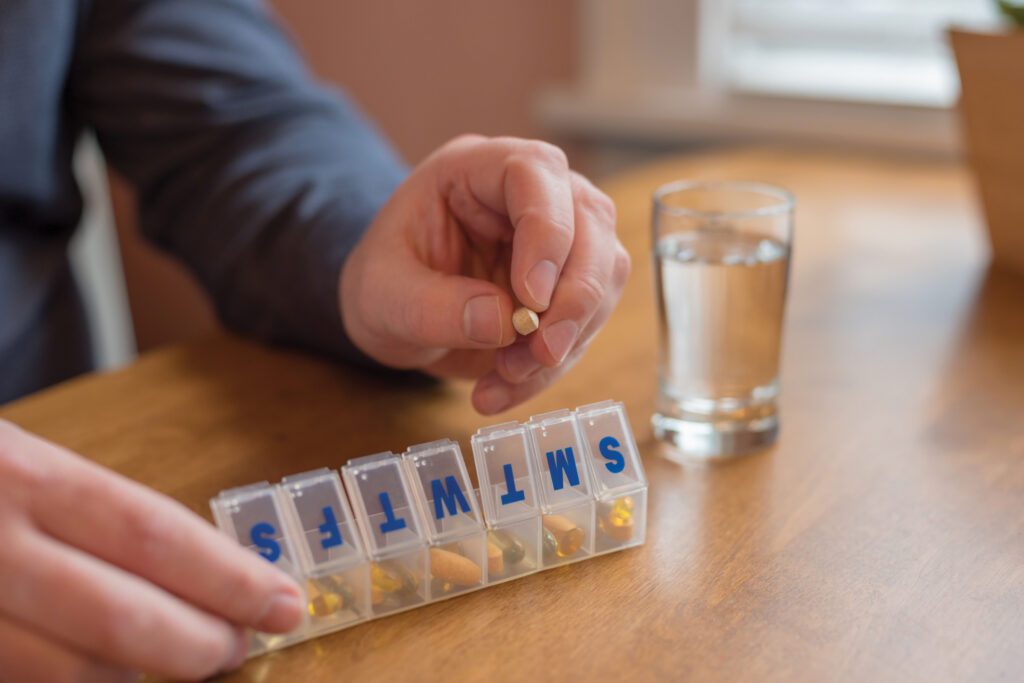
Medication misuse can be dangerous, which means making a good management plan is a must.
If you’re over 65, chances are you might be taking as many as five or six medications every day. When taken correctly, medications can contribute to improved health, wellness, and daily functioning. But when taken incorrectly, they can do more harm than good. And unfortunately, the American Geriatric Society reports that 30% of seniors in the United States have negative reactions to a prescription medication due to missed doses or doubling up on doses.
These tips can help you manage your own medications with mastery, or set your loved ones up for success.
Use a pill box.
We’ve all seen those plastic day-of-the-week pill boxes, and they are the key to organization! They make it easy to keep track of which medications you need to take on a daily basis, along with the proper dosages. It may even be beneficial to have two pill boxes – one for the morning and one for the evening – if you take different amounts each time. Keep a chart or schedule that shows you which medications to take when, and how much to take, to ensure you fill each box correctly.
Incorporate your medications into your routine.
People are busier than ever these days, which can make keeping track of the medications you’ve taken harder. By incorporating your medications into your daily routine, you’re less likely to forget. Consider getting in the habit of taking your prescriptions right after you’ve brushed your teeth in the morning or with your dinner each night.
Make sure you talk to your physician about why you are taking the medication.
“It is important for the patient to know why they are taking the medication and what the medication is for,” says Dr. Anders Petersen, a family medicine physician with Tennova Healthworks. Understanding what each medication is can help you identify if you’ve been given multiple to treat the same issue or if you’re taking medications for issues you are no longer facing. “Physicians are happy to explain to their patients the impact and purpose for all of their medications so there is no confusion,” he says.
Advice for Caregivers
If you’re a caregiver in charge of managing medications for your loved one, Dr. Andrew Crowe, a pharmacist with Walgreens, recommends getting a HIPPA release approved from the health care provider before care begins. “The release allows the caregiver to gain information on medications and therapy for the patient. This way, he or she can provide feedback to the provider.”
Give yourself reminders.


When taking numerous medications, it can become easy to forget which ones you have taken day after day. Make it easier for yourself to remember when to take each prescription by placing a sticky note on your mirror or steering wheel, or create a calendar with a list of medications and times, checking each off once you’ve taken it. You can also make use of your smartphone, setting alarms to remind you when it’s time to take your pills.
Be aware of medications that aren't considered safe for seniors.
Created by the American Geriatric Society, the Beers Criteria for Potentially Inappropriate Medication Use in Older Adults is a list of medications that should be used with caution or avoided altogether by individuals over age 65. “Physicians regularly reference this list when they are prescribing medications to seniors, since medications can have differing effects with age,” says Dr. Petersen. They may be less effective, or in more serious cases, pose higher risks for negative side effects like dry mouth, constipation, and confusion, among others.
Watch for physical or behavioral changes.
Medications can affect people differently, so if you or your loved one is experiencing any sort of reaction or symptoms that seem unusual, contact a physician immediately. Dr. Crowe shares, “If you are experiencing a side effect, discuss it with your pharmacist or doctor. If no feedback is given, the health care professional will never know that a change in the medication therapy is needed.”
Bring a list of all your medications to the doctor with you, and stick to one pharmacy.
Be sure to keep a complete list of every medication you or your loved one is taking – this includes both prescribed and over the counter medications. List the dosage size and any important information cautioned on the package too. Dr. Crowe says, “Bring a copy of all medications you are taking to every doctor’s appointment and make sure the pharmacy has a list for your profile. That way, he or she can look for interactions and contraindications.”
Ask questions when you're unsure.


A reported one-third of all seniors haven’t spoken to their doctor about their prescriptions in the last year. Never be afraid to ask questions! If you wonder how a medication might affect you or your loved one, what the proper dosage is, how to store it, how to take it correctly, or anything else, talk to your provider. “Patients should communicate with their physician and express any concerns or questions they may have to better understand their medications and medical conditions,” says Dr. Petersen. The more you know about what your medication is supposed to do, the easier it will be to recognize when things aren’t quite right.
Prescription medication is common for aging individuals, and it’s vitally important to help treat symptoms and keep you feeling happy and healthy. Taking multiple medications can become quite cumbersome though, so develop a plan that works for you and keeps your schedule from becoming overwhelming. That way you can focus on the important things in life without worry.


Dr. Anders Petersen
Family Medicine Physician, Tennova Healthworks


Dr. Andrew S. Crowe
Pharmacist, Walgreens Pharmacy

